Even in the 1970s, when I was an avid magazine reader, it was impossible to keep up with all the publications and all the stories. I relied on annual anthologies collecting the best short SF. At the time, such projects were helmed by Wollheim, del Rey, and Carr (I was just a bit late for Merrill). Although the Best Of annuals all had the same core mission, no two editorial teams had quite the same idea what “best” might be, so I didn’t end up buying the same short story over and over. When I did, it was an indication that story was worth the reader’s attention.
These days, there are many venues for short fiction, and there enough Best Of annuals that keeping track of them can be challenging. Of course, you’re all aware of the Horton, Clarke, and Strahan annuals; here are four that may be new to you.
The Year’s Best Science Fiction & Fantasy Novellas edited by Paula Guran
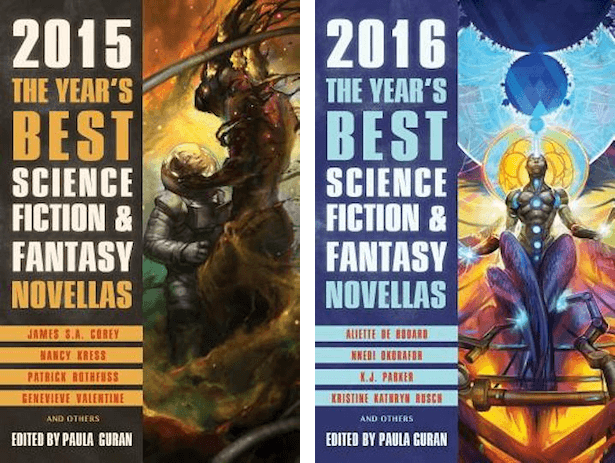
One of the more appealing aspects of many Best Of annuals is that they tell you up front what their specific focus is. In the case of Paula Guran’s project, it was novellas. Novellas, being in the words of SFWA “at least 17,500 words but less than 40,000 words,” present the editor with a dilemma: Does one opt for a slender volume with only three or four novellas or does one opt for a chonky boy with a wider selection and hope that the printer can bind it? Guran has opted for the second option: 2015’s entry was nine stories and 573 pages, while 2016’s was nine stories and 527 pages. Authors whose work was featured include Aliette de Bodard, Usman T. Malik, Nnedi Okorafor, and Patrick Rothfuss.
There were just two volumes in the series. This is not the first time someone has curated a Best Novella of the Year anthology series; the late Terry Carr helmed The Best Science Fiction Novellas of the Year in 1979 and 1980. It too went on hiatus after two volumes. Novellas being a perfect length for SF, I don’t know why projects like this do not have more extended runs. Perhaps the current golden age of novellas offers a more favorable environment?
Best of British Science Fiction edited by Donna Scott
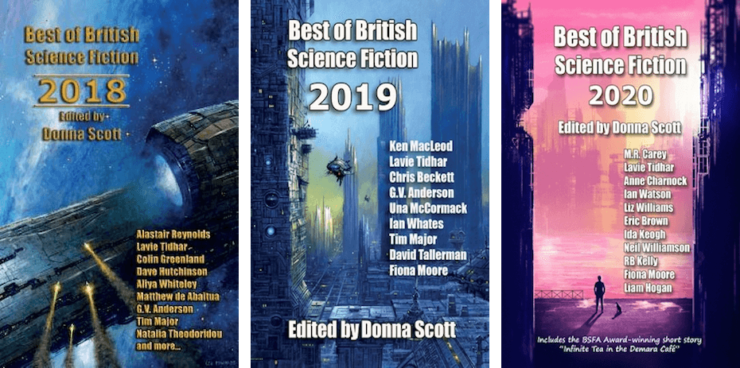
(2016, 2017, 2018, 2019, and 2020)
Here we venture into the overtly regionally specific 1 Best of anthology. Now, previous Best Ofs were region specific in effect, having drawn almost exclusively on American sources. But they assumed a global importance2—a thoughtless assumption that leaves out the rest of l’anglophonie and all of the non-Anglophone world (including some such bits inside the US).
Anyone conversant with the field knows that the UK has produced its share of top-quality SF. Scott provides ongoing proof that this is still true, drawing on the work of well-established writers like Watson, Greenland, and Hamilton, as well as relative newcomers like Fenn, Thompson, and Tidhar.
Year’s Best Aotearoa New Zealand Science Fiction, edited by Marie Hodgkinson
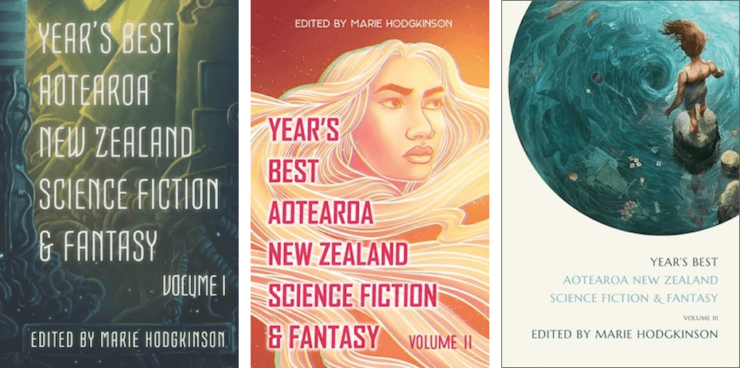
(volumes I, II, and III, published in 2019, 2020, and 2021 respectively)
What better source for speculative fiction than one of the last remnants of a long-sunken continent? Despite the island nation’s comparatively small population (somewhat fewer people than live in Toronto) the anthologies suggest a vibrant SF community. To date I’ve only read the first volume. There seemed to be something of a lean towards stories of apocalypse; that was tolerable, as the stories didn’t revel in disaster but rather focused on reconstruction afterward. There were also other sorts of stories, some of them unfolding outside the boundaries of strictly defined fantasy or SF. I found the range intriguing. I’m all too used to Canadian mainstream award-winning literature which can seem at times narrowly focused to the point of parody.3
The Year’s Best African Speculative Fiction (2021): Volume One, edited by Oghenchovwe Donald Ekpeki
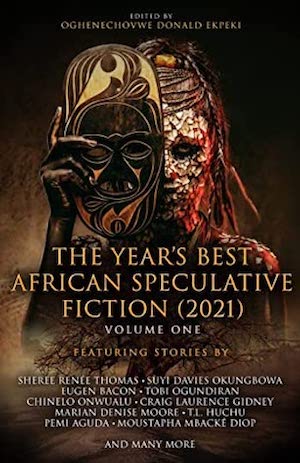
Edited by Nommo Award and Otherwise Award winner Ekpeki, this wide-ranging anthology draws on fiction by Africans and the global African diaspora. Some of the contributors, authors like Tobias S. Buckell, Sheree Renée Thomas, and C.L. Clark, are familiar to me. Far more are names I am only now encountering, an oversight on my part this anthology will permit me to correct.
Speaking of new discoveries, that striking cover design is by Maria Spada, clearly someone whose work is worth keeping an eye out for.
***
No doubt there are many recent Best Of anthologies of which I am not aware. Feel free to inform me of them in comments.
In the words of Wikipedia editor TexasAndroid, prolific book reviewer and perennial Darwin Award nominee James Davis Nicoll is of “questionable notability.” His work has appeared in Publishers Weekly and Romantic Times as well as on his own websites, James Nicoll Reviews and the Aurora finalist Young People Read Old SFF (where he is assisted by editor Karen Lofstrom and web person Adrienne L. Travis). He is a four-time finalist for the Best Fan Writer Hugo Award and is surprisingly flammable.
[1]I suppose “Tesseracts” is the Canadian equivalent, but its focus is sufficiently different from the series mentioned here that it will be left for a later essay.
[2]I don’t believe I need to discuss why the World Series is called the World Series at this juncture.
[3]Although I am sure each melancholy novel about disappointment, family disintegration, and the inevitability of old age, death, and Tim Hortons offers its own unique take on gloom.










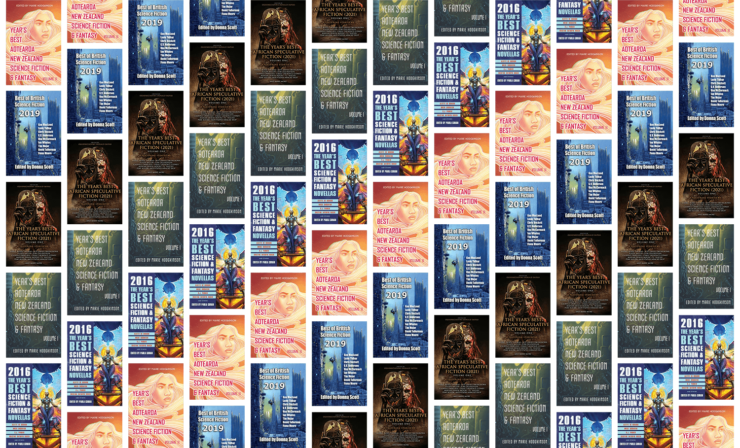
I find your description of Canadian literature to be overly cheerful.
(Joking aside, thank you for mentioning Year’s Best Aotearoa New Zealand SF. I hadn’t heard of that collection before.)
My attention has been drawn to a fifth Best of I overlooked: Lavie Tidhar’s The Best of World SF:
https://www.amazon.com/Best-World-SF-3/dp/1838937641
Sigh. My mother’s maiden name was “Strachan”. The editor, on the other hand, spells his last name Strahan.
@3 – Fixed!
Agree that Guran’s series ended wayyyy too soon. Luckily, Allen Kaster has an equivalent series called “Year’s Top SF Short Novels”, now in its eighth year.
The “Long List Anthology” and Kaster’s “Year’s Top Hard SF Stories” also highly recommended.
Thanks for the shout-out!
Thanks for the spotlight on the YBASF anthology!
I remember Terry Carr’s long out of print novella anthologies. As I remember he almost perfectly predicted the Hugo and nebula nominees in both volumes. Uncanny!